Past Events
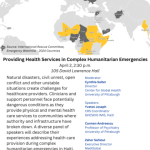
- 105 David Lawrence Hall
Natural disasters, civil unrest, open conflict, and other unstable situations create challenges for healthcare providers. Clinicians and support personnel face potentially dangerous conditions as they provide physical and mental health care services to communities where authority and infrastructure have broken down. A diverse panel of speakers will describe their experiences addressing healthcare provision during complex humanitarian emergencies in Ukraine, Haiti, and Gaza. Guest speakers include: Dr. Thaer Ahmad who just returned from volunteering in Khan Younis Gaza, Dr. Yvetot Joseph calling in from Haiti, and Dr. Sahloul, executive director Medglobal and Dr. Andreescu , Human Rights in Mental Health-FGIP
- Zoom Webinar
The aim of this panel is to bring together academic and non-academic perspectives to reflect on two issues:
1) The challenges Europe/the EU faces in terms of programs that target Roma inclusion, equality, and community development.
2) Roma-driven social justice initiatives at the local, national, or transnational level that seek to address the gap between policy and community needs.
Moderated by:
Angéla Kóczé, Director of the Romani Studies Program (Central European University)
Zsuzsánna Magdó, Associate Director of the Center for Russian, East European, and Eurasian Studies (University of Pittsburgh)
Panelists:
Adriana Helbig, Associate Dean for Undergraduate Studies (DSAS) and Associate Professor of Music
László Fosztó, Senior Researcher (Romanian Institute for Research on National Minorities)
Silas Kropf, Independent Consultant and former Member of the Independent Commission on Anti-gypsyism in Germany

- Rob Mucklo
- Global Hub
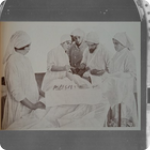
- Anna Kovaleva, Tyler Sinder
- FRICK FINE ARTS AUDITORIUM
Watch Russia's first feminist film- a strong woman obstetrician Anna Betskaya has a brilliant career; husband Nikolai, feeling neglected, starts an affair with a young waitress, who soon gets pregnant. Later, the two women decide to work cooperatively at the doctor's office and raise the baby together.
Delve into the melodrama atmosphere of a 1910s motion-picture theatre! Admission is free, registration required

- Jacob Heilbrunn, Damir Marusic
- 105 Lawrence Hall
In America Last, Heilbrunn explores the historical phenomenon of American political leaders expressing admiration for authoritarian leaders and dictators abroad, spanning from the early 20th century to the present day. The book examines how influential U.S. intellectuals, journalists, and politicians have been attracted to the perceived strength and leadership styles of foreign autocrats, viewing them as potential models for addressing domestic political and social issues. Jacob Heilbrunn is a nonresident senior fellow at the Atlantic Council’s Eurasia Center and editor of the National Interest. He previously served as senior editor at the New Republic and an editorial writer for the Los Angeles Times. He is a Pittsburgh native and graduate of Taylor Allderdice High School. Damir Marusic is assignment editor at the Washington Post and founding editor or Wisdom of Crowds. Previously, he was executive editor at the American Interest magazine and a senior fellow at the Atlantic Council’s Europe Center.

- Zoom Webinar
EU ENLARGEMENT LECTURE SERIES: 20th Anniversary of the EU Enlargement As part of our continued efforts to bring together experts with diverse perspectives to discuss contemporary issues facing Europe, the European Studies Center/European Union Center of Excellence (ESC/EUCE) along with the Center for Russian, East European, and Eurasian Studies (REEES) offers a new lecture series to commemorate the 20th Anniversary of the EU Enlargement. This virtual lecture series will be held on the last Thursday of each month. 2024 marks the 20th anniversary of the biggest enlargement of the European Union in its history. Ten countries, mainly former socialist Eastern European states, almost doubled the EU from 15 to 25 member states. May 1, 2004, was the triumphal return to the European Family for many. But for some, it initiated a process of disenchantment with the EU and the West. Each month, the ESC/EUCE, together with REEES at the University of Pittsburgh, will focus our attention on a specific country or a group of countries in the EU by inviting experts and eyewitnesses to discuss the hopes and realities of the EU integration before and after expansion to address what hopes were fulfilled and what new hopes exist for the Union in the present. Each session is recorded and later posted on the internet with suggested additional readings and further resources. Please check out our webpage for more details and mark the last Thursday of the month to attend this event. Moderator: Panelist:

- Rob Mucklo
- Global Hub
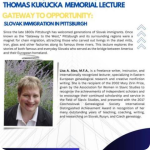
- Lisa A. Alzo
- Cathedral of Learning, Room 332
This year, Pitt's annual memorial keynote lecture on Slovak culture, which helps keep alive the memory of Thomas Kukučka (whose commitment to Slovakia in the 1980s helps future generations to improve their knowledge of the country), will focus on Slovak Immigration in Pittsburgh. Since the 1800s Pittsburgh has welcomed generations of Slovak immigrants. Once known as the "Gateway to the West", Pittsburgh and its surrounding regions were a magnet for chain migration, attracting those who carved out livings in the steel mills, iron, glass, and other factories along its famous three rivers. This lecture explores the stories of both famous and everyday Slovaks who served as the bridge between America and their European Homeland. Lisa A. Alzo, M.F.A. will be presenting. A recording will be made and available to the public for those who cannot make the actual event on 3/24.

- Zoom
As humans rely more and more on electronic devices to support their everyday activities, there are ever present warnings about the impacts such reliance has on human autonomy ranging from who owns and controls information networks, the inequitable impact of technology consumption on peoples and places, varying accessibility of technology around the globe, and the promises and limitations of technology in improving human health. In Spring 2024, the focus will be on the impact technology has on criminal justice. This will include a discussion about technology’s impact on human safety, including the increasing use of machine learning, artificial intelligence, and other technology by various authorities of the criminal justice system. This will include discussions on the benefits and risks in the implementation and automation of such technology within criminal justice apparatuses. We will also consider how such implementation differs across global criminal justice systems, including how this technology is governed.

- Zoom
As humans rely more and more on electronic devices to support their everyday activities, there are ever present warnings about the impacts such reliance has on human autonomy ranging from who owns and controls information networks, the inequitable impact of technology consumption on peoples and places, varying accessibility of technology around the globe, and the promises and limitations of technology in improving human health. In Spring 2024, the focus will be on the impact technology has on criminal justice. This will include a discussion about technology’s impact on human safety, including the increasing use of machine learning, artificial intelligence, and other technology by various authorities of the criminal justice system. This will include discussions on the benefits and risks in the implementation and automation of such technology within criminal justice apparatuses. We will also consider how such implementation differs across global criminal justice systems, including how this technology is governed.

- Various
- Zoom
Many efforts have been made over the past several years to diversify Eastern European and Eurasian studies. This new spotlight surfaces research that has been conducted by many scholars for much longer, highlighting their commitment to telling stories and honoring perspectives of diverse and minority communities. Their work reveals that while there is no unified queer experience in the region, there is often a one-size-fits all state response to the reality of queer lives in many nations within the region. How can a queer-studies focus advance conversations about decolonization in East European and Eurasian Studies? To address this question, Queer Focus will have seven virtual panels featuring speakers from various disciplines and institutions. Panelists and participants will explore how gendered regimes were constitutive of Russo-centric relationships of power, defining the region and how we study it, as we collectively grapple with what it means to re-examine our current research, teaching, and institutional practices.

- Webinar
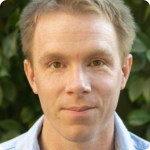
- Dr. James Pickett
- TBA
The broad rubric of identity is the single most dominant research agenda in academic scholarship, and Eurasian history is no exception. When it comes to questions of ethnic identity, scholars most often focus on groups that can boast some kind of institutional backing - such as a nation-state. Yet, historically, there were many ways that people integrated into collectives - whether or not they were conscious of doing so - that did not lead to a modern nation-state. This keynote address highlights some of the Central Asian groups all but forgotten by history, as well as non-identitarian forms of human integration, such as language, cultures of documentation, and performances of sovereignty.

The Undergraduate Research Symposium is an annual event since 2002 designed to provide undergraduate students, from the University of Pittsburgh and other colleges and universities, with advanced research experiences and opportunities to develop presentation skills. The event is open to undergraduates from all majors and institutions who have written a research
paper from a social science, humanities, or business perspective focusing on the study of Eastern, Western, or Central Europe, the European Union, Russia, or Central Eurasia.
After the initial submission of papers, selected participants are grouped into panels according to their research topics. The participants then give 10- to 15-minute presentations based on their research to a panel of faculty and graduate students. The presentations are open to the public.
Limited travel grants are available to help defray travel expenses for accepted participants located outside the Pittsburgh region.
Application deadline: January 7, 2024.
Symposium: March 22, 2024.
https://www.ucis.pitt.edu/creees/urs
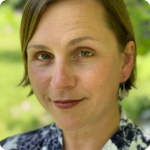
- Cathedral of Learning, CL501
How did the project of Soviet internationalism imagine a future for a “national musical instrument” like the Ukrainian bandura? Drawing on the archive of the Kyiv Palace of Pioneers (KPDU), the mass institution that provided afterschool opportunities for Soviet schoolchildren known as “Pioneers,” alongside interviews with bandura players, this lecture tells the story of the formation of the children’s bandura ensemble in Soviet Ukraine and the violent erasures that enabled its creation. The story begins with the consolidation of the bandura and the centuries-old bardic traditions associated with it as icons of Ukrainian national identity in the 19th and early 20th centuries. In the Soviet 1920s, the bandura became entangled in a series of violent erasures: as the “old style” of playing was repressed, as tradition-bearers disappeared, and as the bandura’s most flamboyant champion was executed by the Soviet state.
Meanwhile, the Soviet project of rationalizing vernacular music in the service of building Communism saw the broad institutionalization of children’s music ensembles, including children’s bandura ensembles, at the premier Pioneer Palace of Soviet Ukraine. The history shows how children, imagined to be “powerful agents of revolution” (Kirschenbaum 2001) in the early Soviet period, were in fact often unruly vectors through which the ideological values of Soviet internationalism could be expressed. Based on archival materials and the testimony of a member of the first children’s bandura ensemble at KPDU in the late 1930s, this lecture reveals the contradictions that were inherent in engineering the Communist future through children’s music.
Maria Sonevytsky is Associate Professor of Anthropology and Music at Bard College
https://mariasonevytsky.com/
- ‹ previous
- 12 of 46
- next ›
